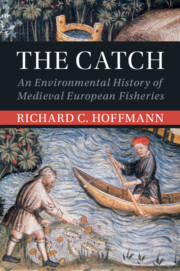Book contents
- The Catch
- Studies in Environment and History
- The Catch
- Copyright page
- Dedication
- Additional material
- Contents
- List of Figures
- List of Maps
- Preface and Acknowledgements
- Abbreviations Used in Notes and Bibliography
- Introduction
- 1 “Natural” Aquatic Ecosystems around Late Holocene Europe
- 2 Protein, Penance, and Prestige
- 3 Take and Eat
- 4 Master Artisans and Local Markets
- 5 Aquatic Systems under Stress, c. 1000–1350
- 6 Cultural Responses to Scarcities of Fish
- 7 Going beyond Natural Local Ecosystems, I
- 8 Going beyond Natural Local Ecosystems, II
- 9 Last Casts
- Appendix A Glossary of European Fishes Named in This Book
- References
- Index
7 - Going beyond Natural Local Ecosystems, I
Carp Aquaculture As Ecological Revolution1
Published online by Cambridge University Press: 11 May 2023
- The Catch
- Studies in Environment and History
- The Catch
- Copyright page
- Dedication
- Additional material
- Contents
- List of Figures
- List of Maps
- Preface and Acknowledgements
- Abbreviations Used in Notes and Bibliography
- Introduction
- 1 “Natural” Aquatic Ecosystems around Late Holocene Europe
- 2 Protein, Penance, and Prestige
- 3 Take and Eat
- 4 Master Artisans and Local Markets
- 5 Aquatic Systems under Stress, c. 1000–1350
- 6 Cultural Responses to Scarcities of Fish
- 7 Going beyond Natural Local Ecosystems, I
- 8 Going beyond Natural Local Ecosystems, II
- 9 Last Casts
- Appendix A Glossary of European Fishes Named in This Book
- References
- Index
Summary
As the Middle Ages drew to a close, however, a rising share of Europeans were eating fish from systems other than their natural local waters. By 1500 around Paris, for instance, elite menus featured carp and headless codfish, while lesser folk made do with herring and haddock. Beside the Mediterranean, Valencia was receiving millions of Atlantic sardines and hake, while Romans could get herring from the North Sea, Norwegian cod, and tuna from Sicily. Both cultured carp and fishes from Europe’s economic frontiers changed Europeans’ relations with aquatic nature.
Carp aquaculture colonized nature, creating artificial habitats to rear an organism alien to western Europe. Late fifteenth- and early sixteenth-century financial records and instructional manuals from east-central Europe detail an original and distinctive European mode for farming fish. Those practices provide a benchmark to identify and trace their creation in twelfth- to thirteenth-century France – where the carp was a late invader – and subsequent spread eastwards of the innovation. Human-controlled aquaculture created thousands of local ecological revolutions across interior Europe, providing inland elites with a steady source of live fresh fish, serving as a vehicle of elite power over subjected nature and people, and replacing indigenous ecosystems with private anthropogenic habitats tailored for domesticated, soon also feral, invaders. For contemporary writers fish had become objects of human agency.
Keywords
- Type
- Chapter
- Information
- The CatchAn Environmental History of Medieval European Fisheries, pp. 268 - 315Publisher: Cambridge University PressPrint publication year: 2023



